Reclaim Your Parental Authority To Help Your Child | Ryan Wexelblatt, LCSW – Founder, ADHD Dude

Does it feel like your child with ADHD is running the household? Are you tiptoeing around emotional blowups, giving in just to avoid another meltdown, or feeling like you’ve lost control of your home?
If so, you’re not alone—and you’re not failing. In fact, this dynamic is incredibly common in families of kids with ADHD. Research shows that children with ADHD can wear their parents down more quickly than their neurotypical peers. But the good news is this: you can reclaim your parental authority to help your child—and I’m going to show you how.
These are actionable, evidence-informed strategies I teach inside Scaffolding Better Behavior, my parent behavior training program. They’re designed to help you step back into your role at the top of the parent-child hierarchy—where your child actually wants you to be, even if their behavior says otherwise.
Identify and Challenge Irrational Thoughts
One of the first barriers to reclaiming your parental authority is often your own thinking. Parents of kids with ADHD frequently hold irrational beliefs that get in the way of setting boundaries. These thoughts aren’t based in evidence, but they can feel very real:
-
“If I set limits, my child won’t love me.”
-
“If I don’t give in, I’ll lose our connection.”
-
“If I parent differently, they’ll resent me as an adult.”
-
“I’m failing my child by saying no.”
If you recognize yourself in these thoughts, you’re not alone. But if you’re parenting from a place of fear, guilt, or avoidance, it’s time to challenge those beliefs. I often recommend parents work with a therapist trained in Cognitive Behavioral Therapy (CBT) or Acceptance and Commitment Therapy (ACT) to address this internal roadblock—not for your child, but for you.
Enlist Supporters Who Your Child Respects
In Scaffolding Better Behavior, I teach a concept called Enlisting Supporters. These are adults your child respects—such as a grandparent, uncle, older cousin, coach, or family friend. They don’t have to be local. What matters is that your child values their opinion.
When your child is struggling with behavior at home—especially behaviors like aggression, destructiveness, or disrespect—these supporters can reach out with a simple, supportive message. Not to discipline or psychoanalyze, but to say:
“Hey, I heard you’re having a hard time treating your mom well right now. I’m thinking about you. Let me know if I can help.”
This works because many kids with ADHD don’t want people outside the family to know about their behavior. When they realize it’s not a secret anymore—and that people they respect are aware—it creates a powerful accountability effect.
Acknowledge That Some of Your Past Parenting May Not Have Helped
One of the most disarming and powerful things you can say to your child is:
“We’ve realized that some of the ways we’ve been parenting you haven’t been helpful. And because we love you, we’re going to do things differently.”
This isn’t about blaming yourself or making it about your guilt. It’s about demonstrating leadership. You’re not asking your child to change—you’re letting them know that you are changing because what you’ve been doing hasn’t served them well.
Create and Deliver a Parenting Announcement
This is a strategy I adapted from the Nonviolent Resistance framework developed by Dr. Haim Omer. It’s called an announcement—a short, formal message you read aloud or write to your child.
The purpose of the announcement is to clearly state:
-
What you’ve been doing that isn’t helpful
-
How your parenting is going to change
-
Why you’re making this change—because you love your child and want to help them succeed
This isn’t a negotiation. It’s a declaration of leadership. And it helps your child understand that something fundamental is changing—not just another empty threat or new house rule that will be forgotten by the weekend.
Put Daily Expectations in Place
One of the most common problems I see in families with ADHD kids is what I call “high-giving, low expectations.” Kids get access to phones, screens, and comforts—but are expected to give little or nothing in return.
This leads to entitlement, inflexibility, and a complete lack of respect for boundaries at home.
To fix this, you must put daily expectations in place. That means your child earns access to screens, devices, or other privileges by:
-
Helping around the house
-
Treating family members respectfully
-
Meeting behavior and responsibility expectations
This isn’t punishment—it’s accountability. It teaches your child that privileges are earned, not given, and it reinforces the value of mutual respect in your home.
Understand Why Reclaiming Your Parental Authority Helps Your Child
When you reclaim your parental authority to help your child, something powerful happens—they feel safer.
Kids with ADHD who control the dynamic at home know, deep down, that they’re not supposed to be in charge. That creates anxiety. It creates emotional instability. And it prevents them from building the self-confidence that comes from being guided by calm, consistent parents.
Yes, it’s true: things will likely get worse before they get better. That’s because your child will experience this shift as a loss of control. They’ll push back. They’ll test limits. They’ll mourn the old dynamic.
But if you stay consistent, things will improve—and you’ll see it in their energy, their behavior, and the emotional tone of your home.
Want to learn exactly how to reclaim your parental authority and create lasting change?
Visit the Frequently Asked Questions page at ADHDDude.com, or check out Scaffolding Better Behavior, part of the ADHD Dude Membership Site.











